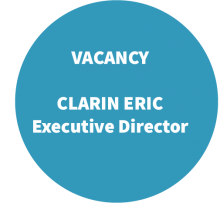CLARIN2021: Registration is Open!
The registration for attendance of the virtual edition of the CLARIN Annual Conference 2021 is now open. We are looking forward to welcoming all authors of accepted papers, members of national consortia and representatives of CLARIN centres, representatives from partner organizations, and anybody else who has interest in becoming part of the CLARIN community and would like to learn more.
Calls for interest in participating in additional programme elements, i.e. CLARIN Bazaar, CLARIN PhD Student Session, CLARIN Consultation Session are still open.

New Members of the CLARIN ERIC Scientific Advisory Board (SAB)
The terms of three members of the CLARIN Scientific Advisory Board ( ) ended on 30 June 2021. CLARIN would like to thank Arianna Ciula, Christopher Cieri and Elena Gonzalez-Blanco for their valuable contribution to the scientific development of the Infrastructure over the past years.
The CLARIN ERIC General Assembly has appointed John Nerbonne as the new chair of the SAB and Paolo Budroni and Matthew Woollard as new members of the SAB. Paolo Budroni and Matthew Woollard will join the other current SAB members: Marina Buzzoni and Jill Cousins. CLARIN is looking forward to a fruitful collaboration.
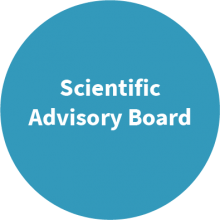
CLARIN seed grants as support for Horizon Europe project proposal preparation
CLARIN has set up a new funding scheme to offer financial support for the preparation of applications for Horizon Europe project funding, specifically for: Horizon Europe Pillar I projects (including ERC) and Horizon Europe Pillar II projects. The CLARIN seed grants can help cover costs associated with:
- Meetings of an international consortium
- External consultancy services
- Support from student-assistants
- Teaching replacement
Representatives of any of the CLARIN consortia or staff affiliated with a CLARIN centre can submit a proposal for a seed grant.
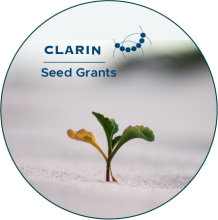
Voices of the Parliament: Tutorial now publicly available
The tutorial Voices of the Parliament. A Corpus Approach to Parliamentary Discourse Research realised by Darja Fišer and Kristina Pahor de Maiti is now publicly available.
This tutorial shows the potential of richly annotated language corpora for research of the socio-cultural context and changes over time that are reflected through language use. The tutorial encourages students and scholars of modern languages, as well as users from other fields of digital humanities and social sciences who are interested in the study of socio-cultural phenomena through language, to work with user-friendly digital tools for the analysis of large text collections.
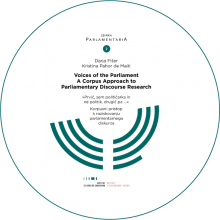
CLARIN Knowledge CKCMC and K-Dutch new nodes in the CLARIN network of K-Centres
CLARIN is proud to announce that CLARIN Knowledge CKCMC and K-Dutch are officially recognized as CLARIN K-Centres.
The CLARIN Knowledge Centre for Computer-Mediated Communication and Social Media offers expertise on language resources and technologies for Computer-Mediated Communication and Social Media. Its basic activities are to (1) give researchers, students, and other interested parties information about the available resources, technologies, and community activities, (2) support interested parties in producing, modifying or publishing relevant resources and technologies and (3) organize training activities. Visit the CKCMC K-Centre
K-Dutch is the place for anyone who wants to find out more about the Dutch language: linguistic properties, language advice, available tools and resources, etymology, dialects and many other things. K-Dutch is hosted by the Instituut voor de Nederlandse Taal (Dutch Language Institute), which is also a CLARIN-B centre and host of many tools, lexica and corpora for Dutch, which are, in general, freely available. Learn More about K-Dutch
More information on how to have your centre recognised as a CLARIN K-centre
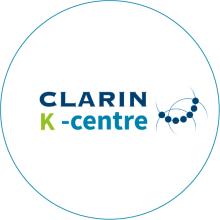
Tour de CLARIN: The French CLARIN Knowledge-Centre CORLI for Corpora, Languages and Interaction
In July, Tour de CLARIN focuses on the CORLI Knowledge Centre. This K-centre was established in July 2020, is part of the CORLI consortium, and is coordinated by the digital humanities infrastructure Huma-Num. This K-centre functions as an interactive online platform which centralizes and provides cross-border access to knowledge through both proactive services, such as building corpora and metadata standardization procedures, and reactive services, through a pool of researchers and data specialists providing additional knowledge and technical support when needed.
The CORLI K-centre also offers every year training opportunities on the use of digital tools, and it issues regular financial support calls for the finalization and transformation of existing corpora to ensure compliance with the FAIR principles.
Read more about Tour de CLARIN
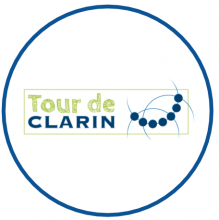
CLARIN Resource Families: Dictionaries
The CLARIN Resource Families initiative provides a user-friendly overview of the available language resources in the CLARIN infrastructure for researchers from digital humanities, social sciences and human language technologies.
This month CLARIN highlights dictionaries. Dictionaries are primarily created for human use (e.g., language learning/teaching, translation, lexicology) and are typically semasiological, which means that they are organized around words and contain information on their meanings, definitions, pronunciation, etc.
There are 97 dictionaries in the CLARIN infrastructure. Most of them (57) are monolingual, accounting for 14 languages. The rest (40) include a variety of both bilingual and multilingual language combinations. In the vast majority of cases, the dictionaries can be directly downloaded from the national repositories or queried through easy-to-use online search environments.
See the overview of dictionaries
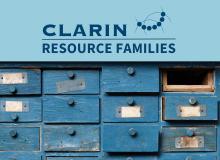
UPDATES FROM THE NATIONAL CONSORTIA
Recap on the 1st CLARIN:EL Summer School 2021
6-8 July, virtual event
The 1st CLARIN:EL Summer School Language Technology and Social Sciences & Humanities: a new research methodology, organized by the CLARIN:EL team of ILSP/Athena RC in the context of the APOLLONIS Project, took place online on 6-8 July 2021.
The Summer School was attended by 75 participants, with backgrounds in library science, linguistics, language studies and literature, education, history/archaeology, computer science, digital humanities and political and social sciences.
The participants had the opportunity to get acquainted with the basic concepts of language technology and language resources, take a deep dive into data collection, curation and processing, to discover LT-based applications and to hear out about the role of national and European Language Resources & Technologies Infrastructures. During the 3-day summer school, the participants also familiarized themselves through hands-on workshops, with the CLARIN:EL Infrastructure, the curation of resources and the use of tools.
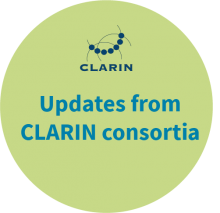
BLOGS
CLARIN Café: ParlaMint Unleashed
28 June 2021, virtual event
Read all about the CLARIN Café ParlaMint Unleashed organised by Tomaž Erjavec (Jožef Stefan Institute), Darja Fišer (University of Ljubljana, Institute of Contemporary History and Jožef Stefan Institute), Maciej Ogrodniczuk (Institute of Computer Science, Polish Academy of Sciences) and Petya Osenova (Institute of Information and Communication Technologies, Bulgaria).
This Café presented the results of the CLARIN-funded ParlaMint project, which harmonised parliamentary corpora for 17 countries and has provided data and tools for focused observations on trends, opinions, decisions on lockdowns and restrictive measures related to the COVID-19 pandemic.
The Café was moderated by Darja Fišer (Chair of the CLARIN User Involvement Committee), who introduced CLARIN and the CLARIN Resource Families, the umbrella under which the ParlaMint project was initiated.
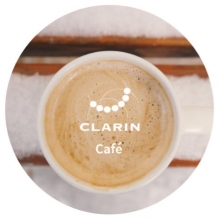
WATCH THIS!
CLARIN2020: Metadata and Legal Aspects
Watch the moderator-led papers session on "Metadata and Legal Aspects'' chaired by Henk van den Heuvel and Lene Offersgaard. This session took place on 6 October 2020 during the first virtual conference day of CLARIN2020. For more detailed information visit the CLARIN2020 programme page and book of abstracts.
EVENTS & CALLS
Call for papers: 2nd workshop on Resources for African Indigenous Language (RAIL)
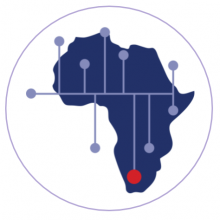
SSHOC Webinar: Showcase your survey for free on the EMM Survey Registry
20 September 2021, from 14:00 to 15:00, virtual event
The EMM (Ethnic and Migrant Minority) Survey Registry is a free online tool for discovering and learning about existing quantitative surveys undertaken with EMM (sub)populations in Europe and beyond.
This webinar is intended for data producers of quantitative surveys, so they can learn:
- why the EMM Survey Registry is an effective tool for showcasing a survey on EMMs' integration and/or inclusion for free with an international audience;
- when and how to contribute metadata for their survey using the back-end platform of the EMM Survey Registry;
- how the EMM Survey Registry is facilitating access to COVID-19 surveys that have been undertaken with EMM respondents.
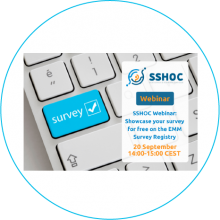
CPSS @ KONVENS 2021 - Save the date
6-9 September 2021, virtual event
Recent years have seen more and more applications of computational methods to the analysis of political texts. This has led to the emergence of different communities (one with a background in political / social science and the other in the areas of computer science) which struggle to get awareness of the relevant work taking place in the respective other community.
The main goal of the workshop is to bridge this gap and bring together researchers and ideas from the different communities, to foster collaboration and catalyze further interdisciplinary research efforts.
Among the invited speakers to the workshop, Tomaž Erjavec from Jožef Stefan Institute Ljubljana will present the ParlaMint project.
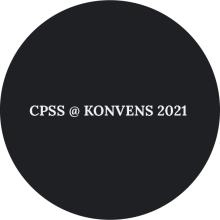
Call for papers: Corpora for Language and Aging Research (CLARe5) Conference
9-11 March 2022, Anchorage, Alaska
The CLARe 5 conference (#clare5) in Anchorage, Alaska 2022 follows the conferences in Louvain in 2014 and 2015, Berlin in 2017, and in Helsinki in 2019. The aim of the conference is to gather researchers who are interested in the study of language and aging research, providing an arena for empirical approaches and innovative methods to gather language data from older adults. The organisers hope to stimulate contributions that help to better identify the position of language and aging research in the broader context of linguistics and sociolinguistics. Interdisciplinary perspectives are especially welcome.
Abstracts submission deadline - 4 October 2021.
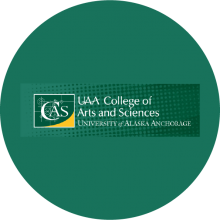
Call for Papers - Chapters solicited for an edited volume on “Multilingual DH”
This edited volume will explore the contemporary and future relevance of multilingualism (and its cultural impact) in DH practices. The volume aims to bring together, advance, and reflect on recent work on the social and cultural relevance of multilingualism for scholarship, pedagogy, and public engagement around digital resources, methods, platforms, infrastructures, and computational tools in the context of DH. It answers the urgent need for approaching the digital not as something which is ‘transparent’ or ‘inanimate’ but as a culturally situated and organic entity embedding past, present, and future worlds which reacts to and impacts on institutional and methodological frameworks for knowledge creation.
Guest editors: Dr Lorella Viola (University of Luxembourg) and Paul Spence (King’s College London).
Papers ubmission deadline - 6 September 2021.
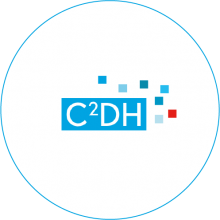
Call for Papers for LaTeCH-CLfL 2021
11 November 2021, virtual event
The call for papers for the 5th Joint SIGHUM Workshop on Computational Linguistics for Cultural Heritage, Social Sciences, Humanities and Literature is now open.
The workshop is co-located with EMNLP 2021. The conference will be held in November 2021 in a hybrid manner: in Punta Cana, Dominican Republic, and on-line.
Papers submission deadline - 5 August 2021
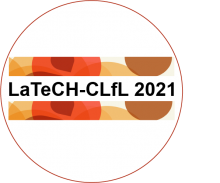
JOB OPENINGS
Vacancy Advertisement: CLARIN ERIC Executive Director
As the last term of office of the current Executive Director will run out in 2022, CLARIN is looking for an inspiring person to chair the Board of Directors ( ) and -in close collaboration with the other board members and the national coordinators- steer CLARIN in consolidating its position in the dynamic landscape. The Executive Director chairs the CLARIN Board of Directors and is supported by the staff of the central CLARIN Office.
